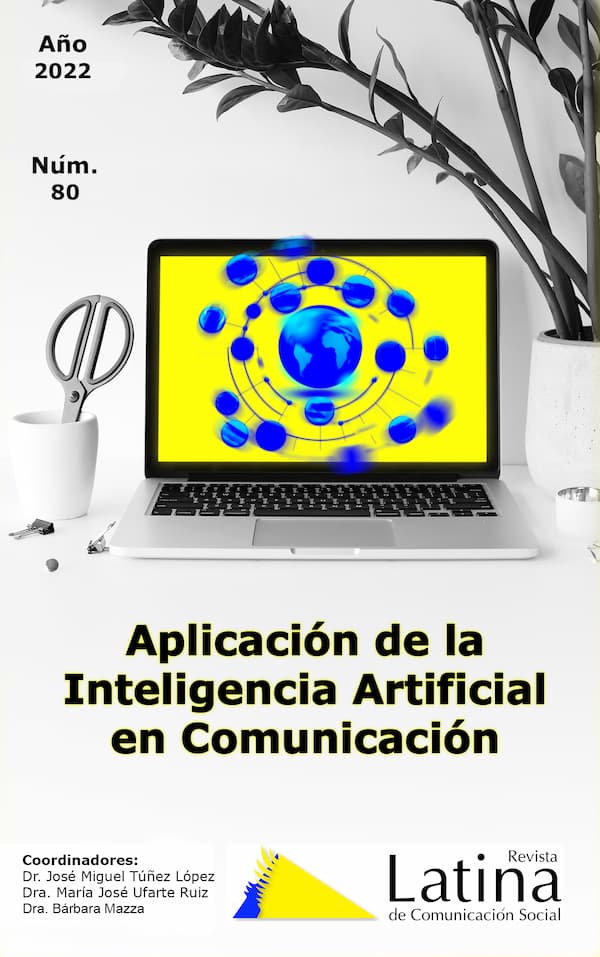Application of artificial intelligence in communication
Keywords:
newsmaking, artificial journalism, automated journalism, robotic journalism, artificial intelligence, robotics public service media (PSM).Abstract
Journalism is undergoing a profound reconversion marked by the economic crisis that began in 2008 and the digitalization of news processes (García-Santamaría, 2014), which has transformed professional routines (Micó and Pérez, 2015) and has opened new avenues for the production (Hermida and Thurman, 2008) and consumption of content. One of them is the application of artificial intelligence to newsmaking, which alludes to the algorithmic process that converts data into narrative and informative texts with little or no human intervention, apart from the initial programming (Barrat, 2013; Harcup, 2014).
It is a technological process that began to be developed in the late 80s of the twentieth century, but in recent years has been adopted by numerous media, agencies and communication companies worldwide with the argument that it increases the production of content, (Mittal and Kumaraguru, 2014; Papadimitriou, 2016), personalizes information (Newman et al., 2019; Slater and Rouner, 2002), identifies newsworthy events for further dissemination (Steiner, 2014), fights misinformation (Flew et al., 2012) and detects profile management in social networks (Dickerson et al., 2014; Ferrara et al., 2016; Tavares; Faisal, 2013) to adapt to user preferences (Keeney, 2015). It is likewise characterized by its precision (Silverman, 2013) and objectivity (Graefe, 2016) when mechanizing search and classification functions. However, it also implies threats to good journalistic practices and its use opens debates that go beyond the replacement of the individual by the machine and move to the field of journalistic ethics and professional deontology.
Artificial journalism (Túñez et al., 2019) is a little-studied emerging reality that is changing the profile and activity of journalists and companies, whose survival arose from their ability to incorporate intelligent technologies into their products, services, processes and modus operandi. We are undoubtedly witnessing a process of inevitable changes and adjustments, in which this technology is configured as an engine of growth for organizations (Mark, 2019). In fact, forecasts indicate that artificial intelligence will reach a massive presence in digital media in the first years of this decade (Newman, 2020), so adapting it is a priority that requires knowing its characteristics and particularities. Hence the importance of knowing its impact on the different dimensions of journalism,
In this scenario of such accelerated changes, the advance of artificial intelligence and its impact on the field of journalism is a global concern, making research and dissemination from academia, in collaboration with different media and projects, decisive. The aim of this monograph, entitled "Application of artificial intelligence in communication" is to serve as a reference to learn about research on artificial intelligence and communication, in general, and on communication and journalism, in particular, and to generate a space for reflection on the transformation brought about by the robotization of newsmaking.
Thematic axes:
Impact of artificial intelligence in communication management.
Journalistic uses of artificial intelligence.
Opportunities and risks of the application of artificial intelligence in communication.
Content co-creation techniques.
Quality of automated journalistic texts.
Training of communicators to work with artificial intelligence.
Professional profiles for artificial journalism.
Competences and skills for automated writing.
Robotized newsrooms.
Public value and artificial intelligence.
Impact of artificial intelligence on WSPs.
Ethical challenges of communication and journalism in the era of artificial intelligence.
Studies and research on AI and communication.
Keywords: newsmaking, artificial journalism, automated journalism, robotized journalism, artificial intelligence, roboetica public Service media (PSM).
Deadline: 01 November 2021.
Downloads
References
No hay referencias

Published
How to Cite
Issue
Section
License
Copyright (c) 2022 Revista Latina de Comunicación Social

This work is licensed under a Creative Commons Attribution-NonCommercial-NoDerivatives 4.0 International License.



